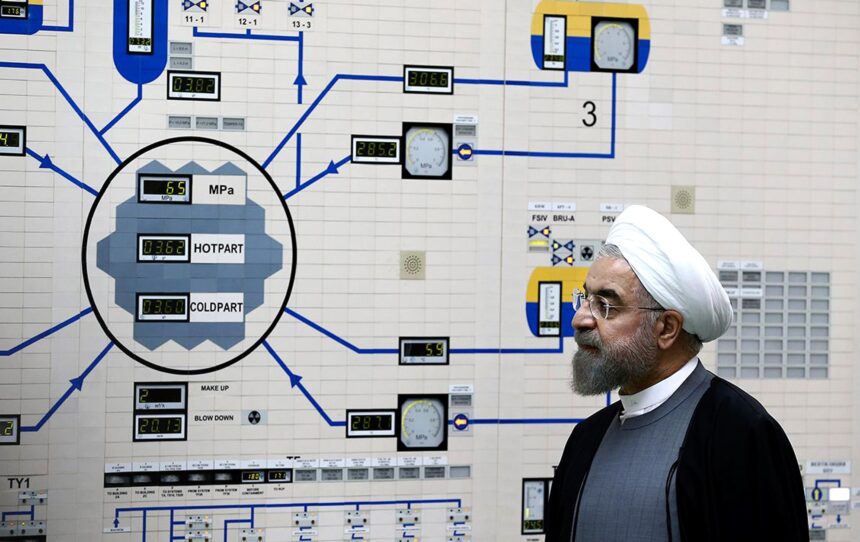Iran’s Nuclear Program: A Global Concern and Its Implications
As international tensions escalate regarding nuclear proliferation, few topics garner as much global focus as Iran’s nuclear initiatives. Since its establishment, this program has been a source of anxiety for major world powers, prompting discussions about regional stability, global safety, and the fragile power dynamics in the Middle East. With allegations of clandestine operations, increasing sanctions, and tense diplomatic negotiations at play, the stakes have reached unprecedented levels. Nations including the United States and Israel express fears that Iran may acquire nuclear weapons capabilities—an outcome that could trigger an arms race in an already unstable region. This article explores the origins of these concerns surrounding Iran’s nuclear goals, analyzes the geopolitical ramifications involved, and contemplates potential future developments in this intricate issue. As global observers remain vigilant, one question persists: what does the future hold for Iran’s nuclear ambitions and how will other nations react?
Iran’s Nuclear Program: Security Concerns in Context
The scrutiny from global powers regarding Iran’s pursuit of a nuclear program reveals a complex tapestry of geopolitical tensions throughout the Middle East. Despite ongoing international dialogues and sanctions aimed at curbing its ambitions, Iran’s commitment to developing its nuclear capabilities raises alarms among both regional neighbors and international stakeholders. Critics contend that if Iran were to successfully develop nuclear weapons technology it would not only destabilize countries like Israel and Saudi Arabia but also potentially spark a broader arms race within an already precarious region. The primary concerns can be summarized as follows:
- Increased Militarization: Neighboring states may feel compelled to enhance their military capacities in response to advancements made by Iran.
- Empowered Proxy Groups: Under a potential protective umbrella provided by nuclear capabilities, Iranian support for militant organizations could intensify.
- Diplomatic Challenges: The possibility of a nuclear-armed Iran complicates existing diplomatic frameworks designed to maintain peace.
The various trajectories available for advancing its nuclear program raise critical questions about future diplomatic interactions as well as compliance with existing treaties aimed at non-proliferation efforts. Should Tehran succeed in establishing a fully operational arsenal of atomic weapons it might embolden its assertiveness on regional matters while undermining decades-long efforts toward disarmament globally. As nations deliberate their responses moving forward—whether through renewed diplomacy or stricter sanctions—the current landscape is pivotal:
| Nations Involved | Their Stance on Iran’s Nuclear Developments |
|---|---|
| United States | Imposing economic sanctions while pursuing renewed dialogue |
| Israel | Aiming to bolster military preparedness; advocating preemptive measures if necessary |
Global Reactions to Nuclear Proliferation: Insights & Strategies
The persistent worries surrounding Tehran’s atomic endeavors arise from multiple factors resonating across borders worldwide.Iran’s geographical positioning, situated within an area fraught with tension heightens apprehensions among neighboring states like Israel significantly more than others do.
Moreover,Iran’s lack of transparency regarding its atomic activities raises serious doubts about adherence to international norms.This situation poses risks not only locally but also globally; should Tehran achieve full-fledged weaponization capability it could incite other nations such as Turkey or Saudi Arabia into pursuing similar paths towards acquiring their own arsenals thus further destabilizing both regional security structures along with broader world peace initiatives.
As ongoing diplomatic engagements unfold,the necessity for cohesive action becomes increasingly evident.
This calls attention towards strategic recommendations directed at fostering preventive measures alongside effective diplomacy:
- Abolishing Existing Agreements:Create stronger frameworks around agreements like JCPOA ensuring rigorous compliance checks are enforced consistently.
- Cultivating Intelligence Collaboration:Pursue enhanced cooperation between countries sharing intelligence related specifically towards monitoring Iranian activities preventing violations proactively before they occur!
- Cultivating Regional Security Alliances:Create collaborative defense arrangements amongst Middle Eastern nations addressing shared threats collectively rather than individually!
Navigating Forward: Diplomacy vs Sanctions Regarding Future Prospects Of Iranian Atomic Initiatives
Tensions continue escalating over Tehran’s aspirations concerning atomic energy leading many governments back into dilemmas balancing between engaging diplomatically versus imposing punitive measures against them! Fears persistently arise suggesting should they become capable enough militarily then this might trigger another round involving arms races throughout volatile regions such as those seen previously during Cold War eras! Countries including Israel/Saudi Arabia perceive any chance arising where they’d face off against armed adversaries directly threatening national interests prompting urgent calls demanding robust countermeasures be taken immediately! Diplomatic attempts initiated via Joint Comprehensive Plan Of Action (JCPOA) established back 2015 sought limiting development opportunities offered reliefs however recent breakdowns cast doubt upon long-term viability associated therein!
Looming ahead lies complexity intertwined deeply rooted within strategies proposed which include:
- Revitalizing Diplomatic Engagements : Strong >Engaging discussions encompassing wider security issues alongside core nuclears aspects providing holistic approaches tackling challenges effectively !< / Li >
- < Strong >Targeted Economic Measures : Strong >Implement specific restrictions targeting entities aiding weaponry production hindering progress without alienating civilian populations unnecessarily !< / Li >
- < Strong >International Solidarity : Strong >Fostering unity amongst allies ensuring coordinated responses strengthening collective stances against aggressive maneuvers undertaken by Iranians !< / Li > ul > p >
A table below outlines possible outcomes stemming from renewed negotiations compared against continued sanction regimes :< / p >
Approach th > Potential Advantages th > Associated Risks th > Renewed Negotiations td > tr > tr /> > > tr /> Conclusion: The Ongoing Challenge Ahead Regarding Iranian Atomic Aspirations And Their Global Impact On Stability Overall! h2>
The enduring unease surrounding Tehran ’ s quest toward achieving advanced technological prowess stems largely from historical grievances coupled together with rivalries present geopolitically speaking raising fundamental queries relating directly tied national securities both locally & internationally alike . As developments continue unfolding rapidly , stakes have never been higher—not solely affecting just Iranians nor immediate neighbors—but impacting entire globe ’ s stability too . Potential escalatory scenarios loom large casting shadows over prospects seeking peaceful resolutions leaving many pondering next steps required navigating through this prolonged saga effectively . With negotiations currently standing precariously balanced amidst evolving reactions worldwide , closely monitoring changes occurring remains imperative moving forward determining whether pathways chosen lead ultimately conflict resolution instead cooperation instead . Observers must remain vigilant since choices made today will resonate far beyond borders shaping future landscapes concerning diplomacy/security architectures entering twenty-first century!









